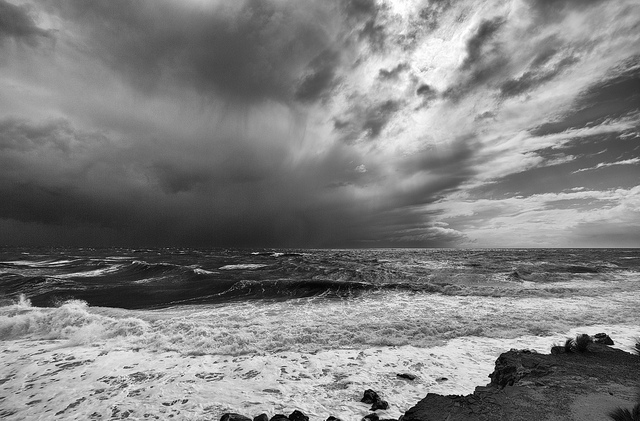Darwin: storm in a port
Evidence presented to Senate Estimates hearings on 21 October over the 99-year lease of the Port of Darwin to a Chinese company shines new light on the elements of the decision. The issue points to serious worries both about the specifics of the port lease and over the wider way in which the Commonwealth handles—more accurately fails to handle—national security assessments of foreign investment proposals.
Defence Minister, Marise Payne, made a statement at Estimates about her discussions with US Secretary of Defense, Ashton Carter, in Boston. These took place the same day the Northern Territory Chief Minister announced the 99-year lease of the Port of Darwin.
Senator Payne: As part of the bilateral engagement during AUSMIN … we have reinforced our very strong agreement to pursue enhanced naval cooperation. That will include additional combined training and exercises between our two navies. The capacity for combined activities and interoperability is very important to both of us. … It is our view that the closer and earlier the discussions with the United States as part of that process, the more effective our interoperability can be.
As Senator Nick Xenophon started to ask questions about the Port of Darwin lease, Minister Payne said: ‘In the first instance, it is my understanding that it is not subject to Foreign Investment Review Board review or approval.’ She then excused herself from the hearings to attend another meeting.
Secretary of Defence, Dennis Richardson took up the case:
With Darwin, Defence does not have any security concerns about the sale of the port to Chinese interests. I note that it is a commercial port; it is not a naval base. The Northern Territory government first broached the possibility of the privatisation of the port in early 2014. …
Senator Xenophon: So it does have a strategic role?
Mr Richardson: Our interest in a commercial port is access to the port and its facilities. The deed of licence, which we signed in May of this year, provided us with the access to the port of Darwin that we wanted. When we were subsequently advised that the sale was to Chinese interests, we examined the possible security implications. Within Defence, that involved the three services. It involved the Australian Signals Directorate, the Defence security agency and the strategic policy area of Defence. No part of Defence had a concern from a security perspective in respect of the sale. The Navy’s interest was overwhelmingly the question of access, not the question of ownership, given that it is a commercial port, not a navy base.
The Secretary’s answer makes it clear that Defence didn’t make a broad judgement about the national security implications of the lease. Their interest was only to assure a limited regime of access for Navy vessels.
Later, in answering a question from Senator Jacqui Lambie about the lease of the port to a Chinese company, Richardson added: ‘the question about China’s broader strategic posture in the region and what they might own or lease in Australia and the security implications of that are really quite separate.’
When asked about whether the lease was discussed with the United States the following exchange took place:
Mr Richardson: No, we did not consult the United States. We did not see a need to, because their arrangements in terms of access to a commercial port remain unchanged. They pay for their access now and they will pay for their access in the future. …
Senator Peris: Are you saying there was no consultation done with the US Navy?
Mr Richardson: No.
Senator Peris: So you do not have any concerns about cooperation with the US forces in Darwin as a result?
Mr Richardson: If the US has any questions about the sale of the port then the US can raise them with us.
So much for ‘closer and earlier discussions’ with the United States. Our ally should be puzzled by this lack of consultation at precisely the same time we claim to be increasing maritime cooperation with both our navies operating out of the Port of Darwin. Surely at some point since early 2014 Defence might have found it useful to find out if the US had ‘any questions.’
The Secretary continued to emphasise that Darwin was a commercial port, not a naval base. But of course commercial ports can have national security significance. Defence’s position on the lease seems to be that the Department’s interests run only to looking after its current and anticipated use of the port.
Mr Richardson: We can only look at this in terms of our interests. Does it raise national security concerns for us as a department? It does not. If other people have other issues about foreign ownership of whatever, that is not an issue that concerns us unless it impinges on our interests and responsibilities.
‘Other people’ may be a reference to the Foreign Investment Review Board (FIRB). But this is an entity which depends on Defence and the intelligence agencies to offer advice about the national security implications of foreign direct investment.
If only to create some public confidence in its decisions the Government urgently needs to redesign the FIRB, give it a statutory basis, separate it from the Treasury, and build a genuine capability to make assessments of risk to national security.
Post script
Shortly after the Estimates Committee Hearings, Defence made public comment opposing another possible privatisation—that of Defence Housing Australia (DHA). The ABC reported a statement from the Chief of the Defence Force that the ADF ‘supports the continuation of DHA as a government-owned entity.’
DHA has been praised for its management acumen as a Commonwealth owned entity, but its privatisation—which Government has in any event ruled out—raises no national security implications.
If only a few DHA houses had fallen within the Port of Darwin precinct. That might have made a world of difference.
